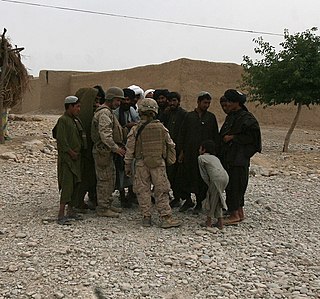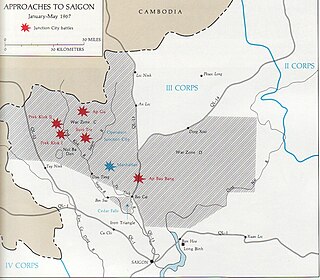Related Research Articles

A battle is an occurrence of combat in warfare between opposing military units of any number or size. A war usually consists of multiple battles. In general, a battle is a military engagement that is well defined in duration, area, and force commitment. An engagement with only limited commitment between the forces and without decisive results is sometimes called a skirmish.

The United States Air Force (USAF) is the air service branch of the United States Armed Forces. It is one of the eight U.S. uniformed services. Initially formed as a part of the United States Army on 1 August 1907, the USAF was established as a separate branch of the U.S. Armed Forces on 18 September 1947 with the passing of the National Security Act of 1947. It is the second youngest branch of the U.S. Armed Forces and the fourth in order of precedence. The U.S. Air Force articulates its core missions as air superiority, global integrated intelligence, surveillance and reconnaissance, rapid global mobility, global strike, and command and control.

Military intelligence is a military discipline that uses information collection and analysis approaches to provide guidance and direction to assist commanders in their decisions. This aim is achieved by providing an assessment of data from a range of sources, directed towards the commanders' mission requirements or responding to questions as part of operational or campaign planning. To provide an analysis, the commander's information requirements are first identified, which are then incorporated into intelligence collection, analysis, and dissemination.

An audit is an "independent examination of financial information of any entity, whether profit oriented or not, irrespective of its size or legal form when such an examination is conducted with a view to express an opinion thereon.” Auditing also attempts to ensure that the books of accounts are properly maintained by the concern as required by law. Auditors consider the propositions before them, obtain evidence, and evaluate the propositions in their auditing report.
In Operation Mountain Viper, the United States Army and the Afghan National Army worked together from August 30 to early September, 2003, to uncover hundreds of suspected Taliban rebels dug into the mountains of Daychopan district, Zabul province, Afghanistan.
A military operation is the coordinated military actions of a state, or a non-state actor, in response to a developing situation. These actions are designed as a military plan to resolve the situation in the state or actor's favor. Operations may be of a combat or non-combat nature and may be referred to by a code name for the purpose of national security. Military operations are often known for their more generally accepted common usage names than their actual operational objectives.

In the field of military theory, the operational level of war represents the level of command that connects the details of tactics with the goals of strategy.
A military campaign is large-scale long-duration significant military strategy plans incorporating a series of interrelated military operations or battles forming a distinct part of a larger conflict often called a war. The term derives from the plain of Campania, a place of annual wartime operations by the armies of the Roman Republic.
Principles of war are rules and guidelines that represent truths in the practice of war and military operations.
Targeting is the process of selecting objects or installations to be attacked, taken, or destroyed in warfare. Targeting systematically analyzes and prioritizes targets and matches appropriate lethal and nonlethal actions to those targets to create specific desired effects that achieve the joint force commander's (JFC's) objectives, accounting for operational requirements, capabilities, and the results of previous assessments. The emphasis of targeting is on identifying resources (targets) the enemy can least afford to lose or that provide him with the greatest advantage, then further identifying the subset of those targets which must be acquired and engaged to achieve friendly success. Targeting links the desired effects to actions and tasks.

Operation Deny Flight was a North Atlantic Treaty Organization (NATO) operation that began on 12 April 1993 as the enforcement of a United Nations (UN) no-fly zone over Bosnia and Herzegovina. The United Nations and NATO later expanded the mission of the operation to include providing close air support for UN troops in Bosnia and carrying out coercive air strikes against targets in Bosnia. Twelve NATO members contributed forces to the operation and, by its end on 20 December 1995, NATO pilots had flown 100,420 sorties.

Operation Junction City was an 82-day military operation conducted by United States and Republic of Vietnam forces begun on 22 February 1967 during the Vietnam War. It was the first and only U.S. combat airborne operation since the Korean War and one of the largest Airmobile operations of the war. The operation was named after Junction City, Kansas, home of the operation's commanding officer.

Internal auditing is an independent, objective assurance and consulting activity designed to add value to and improve an organization's operations. It helps an organization accomplish its objectives by bringing a systematic, disciplined approach to evaluate and improve the effectiveness of risk management, control and governance processes. Internal auditing achieves this by providing insight and recommendations based on analyses and assessments of data and business processes. With commitment to integrity and accountability, internal auditing provides value to governing bodies and senior management as an objective source of independent advice. Professionals called internal auditors are employed by organizations to perform the internal auditing activity.
Strategic communication can mean either communicating a concept, a process, or data that satisfies a long term strategic goal of an organization by allowing facilitation of advanced planning, or communicating over long distances usually using international telecommunications or dedicated global network assets to coordinate actions and activities of operationally significant commercial, non-commercial and military business or combat and logistic subunits. It can also mean the related function within an organization, which handles internal and external communication processes. Strategic communication can also be used for political warfare.
Operation Together Forward, also known as Forward Together, was an unsuccessful security plan in Iraq to significantly reduce the violence in Baghdad which had seen a sharp uprise since the mid-February 2006 bombing of the Askariya Mosque, a major Shiite Muslim shrine, in Samarra.

Operation Mars, also known as the Second Rzhev-Sychevka Offensive Operation, was the codename for an offensive launched by Soviet forces against German forces during World War II. It took place between 25 November and 20 December 1942 around the Rzhev salient in the vicinity of Moscow.
A tactical victory may refer to a victory that results in the completion of a tactical objective as part of an operation or a result in which the losses of the "defeated" outweigh those of the "victor" although the victorious force failed to meet its original objectives.
A troop density also known as the dispersion factor in military science is a statistical value assigned by commanders during the combat operations process in considering the ability of the combat arms to achieve military objectives during a military operation. It reflects combat readiness of the units to participate in engagements with consideration to the terrain and expected enemy strength.
Military operations is a concept and application of military science that involves planning the operations for the projected maneuvering forces' provisions, services, training, and administrative functions—to allow them to commence, insert, then egress from combat. The operations staff plays a major role in the projection of military forces in any wide spectrum of conflict; terrestrial, aerial, or naval warfare needed to achieve operational objectives in a theater of war.

The Marine Raider Regiment, formerly known as the Marine Special Operations Regiment (MSOR), is a special operations force of the United States Marine Corps, part of Marine Corps Special Operations Command (MARSOC). Renamed for its predecessor, the World War II Marine Raiders, this unit is the principal combat component of MARSOC, which is the Marine Corps' contribution to the United States Special Operations Command (USSOCOM).
References
- ↑ Orr, Major George E (1983). Combat operations C3I: fundamentals and interactions. Maxwell Air Force Base: Airpower Research Institute. p. 35.
- ↑ Vego, Milan (2007). "Chapter 10: Operational Art and Doctrine". In McIvor, Anthony D (ed.). Rethinking the Principles of War. Naval Institute Press. p. 174. ISBN 978-1-59114-482-3.